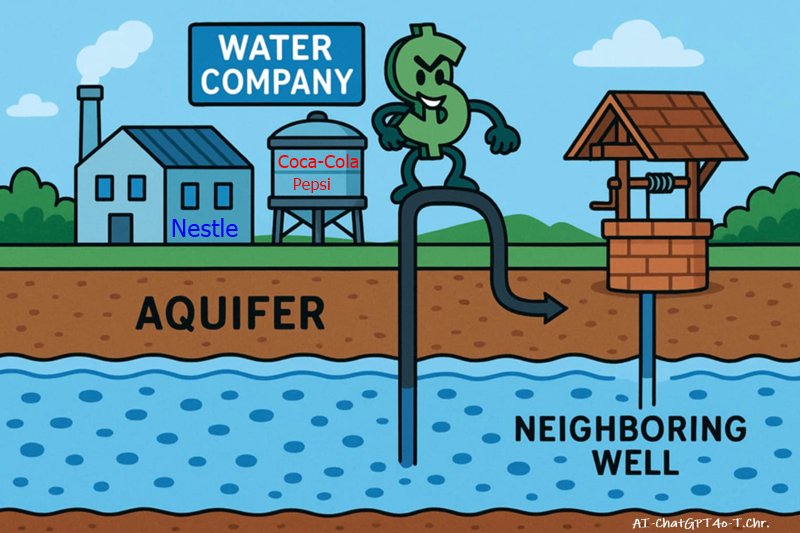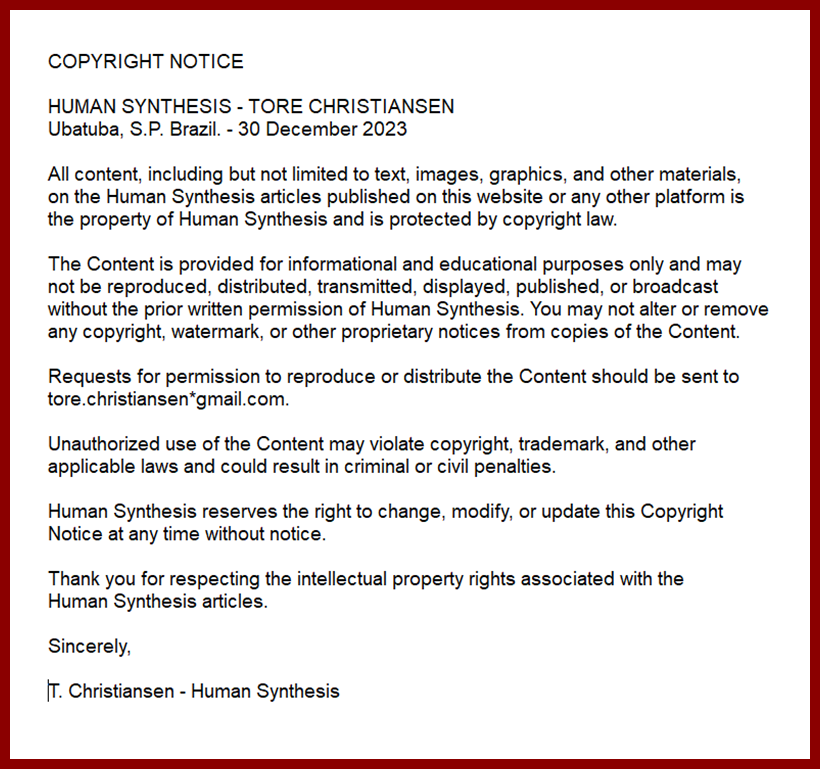WATER COMPANIES GRABBING WATER FROM AQUIFERS.

By AI-ChatGPT4o-T.Chr.-Human Synthesis-27 July 2025
Water companies, particularly large private or semi-private utilities, have been accused of draining aquifers, sometimes even beyond their legal or ethical rights.
This can lead to:
Key Problems:
- Depletion of Shared Resources: Aquifers often stretch across municipal or even national boundaries. When one party extracts too much, it affects neighboring communities that rely on the same underground source.
- Drying Wells & Land Subsidence: Excessive pumping can lower the water table, causing nearby wells to run dry and even lead to subsidence — sinking of the ground, which damages buildings and infrastructure.
- Ecological Damage: Aquifers feed springs, wetlands, and rivers. Overuse can damage ecosystems permanently.
- Privatization vs. Public Need: When water is treated as a profit-generating commodity rather than a public good, the poorest communities often lose access.
Notable Cases:
- California, USA: Nestlé has been heavily criticized for extracting water from aquifers during droughts to bottle and sell.
- Brazil: There have been reports, especially in rural areas or near large industrial users, of aquifer pressure dropping due to overuse by big corporations.
- India: Coca-Cola and Pepsi have faced backlash for depleting groundwater in drought-prone areas.
Terminology:
- "Water grabbing": When powerful actors (states or corporations) take control of water resources, often at the expense of local communities.
- "Aquifer mining": Removing groundwater at rates faster than it can naturally recharge.
Solutions Being Discussed:
- Stricter Regulation & Monitoring of extraction permits and volumes.
- Public Ownership or cooperative management of groundwater resources.
- Recharge projects, like rainwater harvesting and managed aquifer recharge (MAR).
- Legal reforms to recognize water as a human right, not just a resource.
The term "aquifer thieves" is often used informally or critically to describe corporations and water utilities accused of over-extracting groundwater, especially in ways that harm neighboring communities, ecosystems, or future water security. Here are some of the most well-known companies and cases where such accusations have been made:
Major Corporations Accused of Aquifer Overuse or "Theft"
1. Nestlé (now BlueTriton Brands in North America)
- Where: California, Michigan (USA), Ontario (Canada), France
- Allegations:
- Extracted millions of gallons from drought-stricken California for bottled water.
- Took water from Michigan aquifers while local residents in Flint lacked clean water.
- Accused of paying minimal fees for water rights (as low as $200/year).
- Public Backlash: Widespread protests, legal battles, and calls to cancel extraction permits.
2. Coca-Cola
- Where: India, Mexico, El Salvador, and Africa
- Allegations:
- In Plachimada, India, their plant depleted local groundwater, causing wells to dry up.
- Similar accusations in Cholula, Mexico, where Coca-Cola allegedly affected aquifers critical for local agriculture and residents.
- Result: Several plants were forced to shut down under public and legal pressure.
3. PepsiCo
- Where: India, USA, and other developing countries
- Allegations:
- Criticized for over-extracting water in arid zones and for not replenishing local aquifers.
- Targeted alongside Coca-Cola during India’s massive anti-bottling protests.
4. Danone (Evian, Volvic brands)
- Where: France, Mexico, and others
- Allegations:
- In Volvic, France, Danone was accused of draining a protected aquifer and reducing water availability to nearby wetlands and communities.
5. Agribusiness Giants (e.g., JBS, Bunge, Cargill)
- Where: Brazil (Cerrado and MATOPIBA regions), USA
- Allegations:
- Large-scale irrigation of soy, corn, and cattle production draws heavily from aquifers and rivers.
- These sectors often operate with little oversight in frontier areas, putting pressure on underground water reserves.
Government Complicity
- In many of these cases, governments issued extraction licenses or failed to enforce sustainable limits, enabling corporations to overuse groundwater with legal cover.
- Water laws often don't reflect hydrological realities, allowing a company in one municipality to drain aquifers shared with others.
Notable Global Aquifers at Risk:
- Guarani Aquifer (South America) – Threatened by industrial agriculture and foreign interest in privatization.
- Ogallala Aquifer (USA) – Being rapidly depleted by Big Ag and cattle ranching.
- North China Plain Aquifers – Severely stressed by industry and agriculture.
Final Note:
Many companies have been subject to lawsuits, investigations, environmental penalties, and global boycotts. The "grab" is often moral or ecological, where profits are prioritized over community rights and sustainability.
